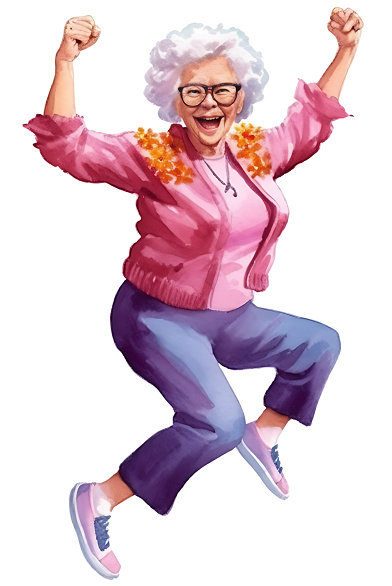 As you get older, you start to notice some of the signs of aging. One of the first changes that becomes apparent is that your skin starts to wrinkle, sag, and get drier. You may also notice that you put weight on in different places.
As you get older, you start to notice some of the signs of aging. One of the first changes that becomes apparent is that your skin starts to wrinkle, sag, and get drier. You may also notice that you put weight on in different places.
And as you age there are also changes in your joints that might make it more difficult for you to maintain your independence and mobility. You may also see changes in your mental health.
While you can’t completely stop the aging process, there are things you can do that will slow it down so that you can maintain your independence and live a full and happy life in your senior years.
Here we’ll take a look at four areas where you can create a lifestyle that will slow the aging process and support you in having a full life.
1 – Make Sure You’re Getting the Right Nutrition
The earlier in life that you honor good nutrition the longer you can stave off the signs of aging. Nutrition is critical to helping prevent disease and increasing your years of life. It can also help you to look and feel younger.
Antioxidants
It’s important that you fill your diet with as many antioxidants as possible. These are chemicals that help your body to fight off environmental oxidation that can lead to faster aging.
Antioxidants are found in high amounts in these foods:
- Blueberries
- Broccoli
- Green including kale, spinach, turnip, and mustard greens
- Strawberries
- Tomatoes
- Apples
- Red grapes
- Beans
While these are foods that have a high concentration of antioxidants, they can be found in a wide variety of foods. You’ll especially find antioxidants in fruits and vegetables, but some are even found in meat, poultry, and whole grains.
Avoid Processed Foods
If you eat a diet that consists of foods that aren’t processed including fruits, veggies, lean meats, dairy products, and whole grains you’ll be in the best shape.
Processed foods, on the other hand, contain little or no nutrition and often are high in calories from sugar, salt, and fat. You’ll want to avoid eating processed foods as much as possible. Processed foods contain:
- White flour
- White sugar
- Trans fats
- Artificial colors
- Artificial flavors
- Preservatives
- Artificial sweeteners
These are all things you’ll want to avoid in order to slow down the aging process. These foods cause your body to experience inflammation, which is responsible for weight gain, joint problems, aging skin, and the increased risk of disease.
If you follow the simple advice to eat “real” food that hasn’t been processed you’ll have fewer signs of aging and better health.
2 – Implement a Proper Skincare Regimen
Skincare is essential to slowing down the aging process. This is the first thing you notice and the first sign to others of your age. It’s important to note that good nutrition is actually the first step toward healthy, younger skin.
Exercise
Regular exercise is actually good for your skin and can slow down aging. That’s because when your body gets heated up, blood rushes to the surface of your skin to let heat escape.
Having more blood flow to your skin actually helps it to become rejuvenated and get the nutrients it needs. Even just walking for 30 minutes a day will help you get this effect.
Hydration
Your skin needs moisture in order to prevent wrinkles and other signs of aging. It’s critical that you drink a lot of water to keep your body hydrated. Your body always distributes nutrients to vital organs first and then to the more peripheral areas of the body.
If you don’t drink enough water, your skin will be one of the first places that gets deprived of water. This causes the cells to shrink and can lead to wrinkles and dry skin.
Three Skincare Steps
Hydration comes from within the body, but you also need to add moisture externally to your skin. As you age you’ll want to maintain a skincare routine that includes gentle cleansing, exfoliation, and moisturizing.
You may need to cleanse your face only once a day if it gets drier. The best time to cleanse is at the end of the day to remove makeup, dirt, and oils that have accumulated throughout the day.
You also need to make sure that you exfoliate. This is a process of removing dead skin cells from the surface of your skin. When you exfoliate, you actually allow your moisturizer to penetrate more deeply into healthy tissue.
You can use a scrub with particles to help remove dead skin cells. This process is called mechanical exfoliation. You can also use chemical exfoliation with products that contain retinols.
These acids help to dissolve dead skin cells and are found in many anti-aging formulas. You’ll also want to look for a moisturizer developed for aging skin. Many moisturizers contain antioxidants and retinols to further slow aging.
3 – Give Yourself a Mental Health Makeover
Many people battle depression as they age. But this shouldn’t be considered a normal condition for people who are aging. Some factors that lead to depression in seniors include:
- Chronic disease
- Social isolation
- Death of a spouse or family members
If you’re struggling with feelings of hopelessness and sadness it’s important that you seek help from a professional as soon as possible. There are many things you can do to improve the way you feel.
Staying social is one critical element of good mental health. Joining groups that allow you to spend time with others is a great way to boost your spirits and provide you with positive mental health.
If you suffer from a chronic disease, a support group may be able to help you feel better about your condition. It’s also important to practice self-care and ask for help and support when you need it.
Often people have the misconception that it’s normal to feel depressed or blue when they get older. Because of that they either don’t seek help or get misdiagnosed. Make sure that you don’t just dismiss your feelings as a normal part of aging.
Beyond depression, seniors also experience mental health issues such as:
- Dementia
- Anxiety
- Problems with sleep
The best way to slow down problems with mental health is to take good care of your body at the youngest age possible. Nutrition and exercise are critical for maintaining good mental health.
It’s also important to accept new challenges that require strategic thinking. Even completing puzzles can help you to stay mentally sharp.
You also want to make sure that you avoid social isolation and make it a point to participate in social activities. You may also find it beneficial to seek spiritual connection through a faith community.
4 – Making Sure You Maintain Your Mobility
One of the biggest concerns for someone who’s getting older is mobility. You may be worried that you won’t be able to get around the way you once did. Some causes of mobility problems include:
- Muscle weakness
- Arthritis
- Vision problems
- Medication use
- Heart disease
- Balance problems related to stroke
Many problems with mobility can be prevented by taking good care of your body with nutrition and exercise. The more activity you get, the more mobile you’ll likely be in your senior years.
It’s also important to treat vision problems that might make it difficult to move properly. Sometimes just by changing your glasses prescription or getting treatment for cataracts you can return to normal mobility.
If you experience muscle weakness or balance problems you should always check with your doctor. An adjustment in medication could be all that you need. But if medication isn’t the problem, exercise could be the solution.
Weak muscles can be strengthened. Even in your senior years you can begin a fitness routine that includes aerobic activity and strength training. Working your muscles will help to prevent fractures and allow you to move freely.
Make sure to talk with your doctor before beginning a fitness routine to make sure it’s appropriate for you. But in most cases, it will be appropriate to take a walk each day and to lift some light weights for your upper body.
Just these simple steps can slow the aging process and help you to remain independent for a long time. Aging doesn’t have to mean giving up the things you love to do.


